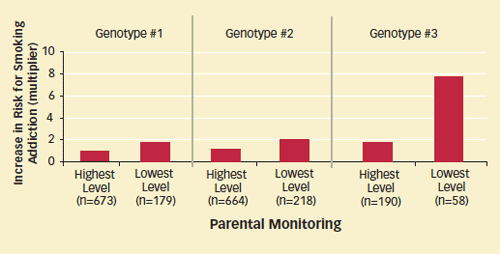 Gene Variant and Low Parental Monitoring Combine to Elevate Smoking Risk: Increased risk of nicotine addiction conferred by one genotype of CHRNA5 dramatically increases among people who experienced low parental supervision as young teens. Read the full description of Gene Variant and Low Parental Monitoring Combine to Elevate Smoking Risk.
Gene Variant and Low Parental Monitoring Combine to Elevate Smoking Risk: Increased risk of nicotine addiction conferred by one genotype of CHRNA5 dramatically increases among people who experienced low parental supervision as young teens. Read the full description of Gene Variant and Low Parental Monitoring Combine to Elevate Smoking Risk.A gene variant that increases the risk for nicotine addiction exerts less influence when parents monitor young adolescents' whereabouts and activities, report Dr. Laura Jean Bierut and colleagues at Washington University in St. Louis and other institutions. They studied 2,027 adults who had smoked at least 100 cigarettes in their lifetime, of whom 1,032 were dependent on nicotine. The researchers determined which participants carried a specific variant of the gene called CHRNA5, which encodes the α5 subunits of nicotinic acetylcholine receptors. The variant elevated the risk for smoking addiction eightfold among people who recalled lax parental supervision during their middle-school years, but it only doubled the risk among people who reported intense parental supervision. Among participants with two other genotypes of CHRNA5, low parental monitoring only roughly doubled risk for nicotine addiction.
In previous research, Dr. Bierut and colleagues had linked an increased risk for nicotine addiction to at least two distinct variants near the α5 subunit of the nicotinic receptor (see "Studies Link Family of Genes to Nicotine Addiction"(Archives)). The team's new research suggests that strong parental supervision may mitigate the influence of some addiction-associated genes by limiting young teens' opportunities to try cigarettes and to smoke regularly. Without these critical steps in the development of nicotine addiction, the genetic vulnerability never comes into play.
Addiction 104(10):1731–1740, 2009. [Full Text (PDF, 393KB)]
